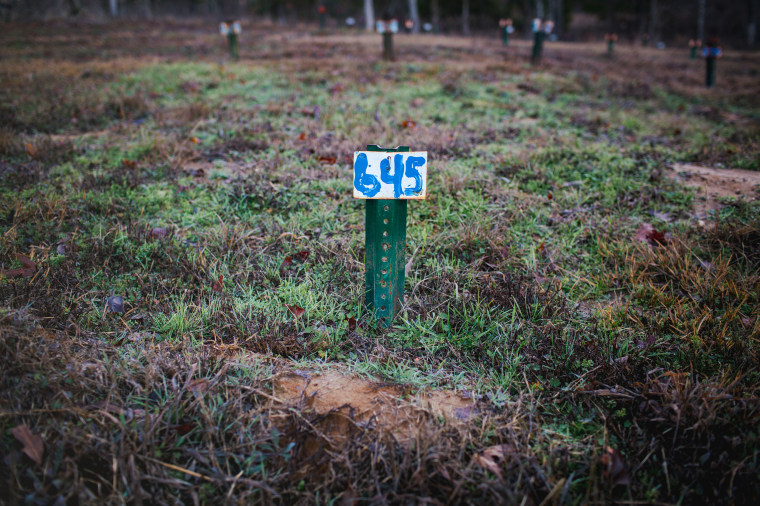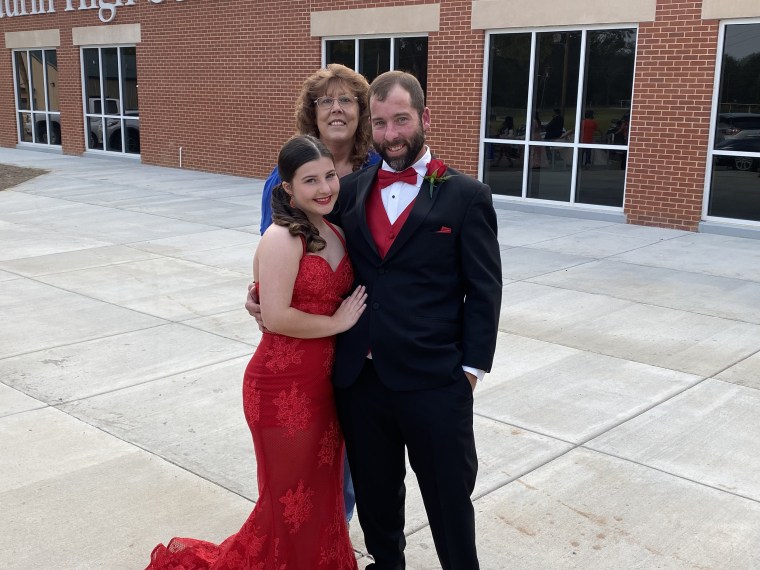This article is part of “Lost Rites,” a series on America’s failed death notification system.
MENDENHALL, Miss. — Gretchen Hankins arrived at a rural church cemetery early Saturday afternoon and walked along a row of granite headstones, reading out each name. One marked the spot where a cousin was buried. Another listed her brother’s name, and another her uncle. Next to her mother’s headstone, she arrived at a freshly dug grave that would soon, finally, hold her only son.
“I know it’s just the body,” she said. “But everybody needs a place you can go to sometimes to tell your family members you love them after they’re gone.”
It had been more than 17 months since Hinds County authorities declared the body of her 39-year-old son, Jonathan David Hankins, “unclaimed” and had him buried in a pauper’s field outside the Hinds County jail work farm in Raymond, an hour’s drive away.
That grave was dug by inmates and marked only by a number — 645 — hand-painted on a metal post.

This is how Mississippi’s most populous county handles the remains of those who do not have money for a funeral or family to claim their bodies. But Jonathan, like several other men buried in the pauper’s field in recent years, did have friends and family who would have claimed him — if only they’d been told he was dead.
For more than a year and a half after her son disappeared from their Rankin County home in May 2022, Gretchen searched and prayed that he would come home. She filed a police report a few weeks after he went missing and pleaded for help on social media. A friend uploaded Jonathan’s name and image to a public database of missing people. Volunteers searched nearby waterways with sonar, thinking they might find him and his car submerged below.
The whole time, authorities in neighboring Hinds County held the answer, but they did not share it.

Jackson police had found Hankins dead from an overdose in a motel on May 23, 2022, only days after he went missing. The Hinds County coroner’s office identified him based on fingerprints soon after, records show. A deputy coroner said he forwarded the information to police, but police say they never got such information.
The records do not say what efforts, if any, the coroner’s office or the Jackson Police Department made to contact Jonathan’s family before the county buried him that September.
Gretchen finally learned of her son’s death and burial in December, after NBC News found Jonathan’s name on a list of people who’d been given pauper’s burials and shared the information with her as part of the news organization’s investigation into botched death notifications. After viewing photos confirming it was Jonathan’s body, she joined a growing number of outraged families who have discovered months or years after the fact that their relatives were buried in the Hinds County pauper’s field.
Like the others, Gretchen had to pay the county $300 to reclaim her son’s remains. Last week, she visited the pauper’s cemetery to watch a crew exhume his body, only to be turned away from the jail site by a sheriff’s deputy. While there, Gretchen confronted Hinds County Coroner Sharon Grisham-Stewart, demanding to know why the county never contacted her.
Grisham-Stewart told Gretchen the lapse was not her fault.
“If I fall short of looking for people, I apologize,” she said. “I don’t know how to find people.”
“But it’s your job,” Gretchen replied, “and when you take that job on, you’re supposed to learn how to do that.”
Gretchen and the other aggrieved family members have demanded answers and hired lawyers. Gretchen hopes to channel her anger to force changes and prevent this from happening to other families.
On Saturday, she was focused on a more immediate task: giving her son the funeral he’d been denied.
Mourners began arriving around 1 p.m. Saturday at the small Simpson County cemetery across the street from the Baptist church that Gretchen attended with her siblings as a child. She wasn’t sure how many people would show up, she said. She hoped the ones who loved her son despite his faults would be there.
“Jonathan wasn’t perfect,” she said moments before a hearse arrived with the casket. “He just didn’t deserve what he got.”

By the time pallbearers carried Jonathan’s casket to the graveside, about 50 people had gathered for the ceremony. An uncle from out of state. A friend who’d grown up calling Jonathan by his nickname “Stitches” — referring to an infamous childhood injury. A cousin who’d been among those posting to Facebook, asking for help finding him.
Thomas Goolsby, who’d offered a $15,000 reward for information about Jonathan’s whereabouts, eulogized his best friend as a loving son and devoted father who struggled to overcome addiction.
“Jon was a good man,” Goolsby said. “He was sometimes a misunderstood man.
He was a co-worker. My best friend. He was my therapist. He was my brother.”

After loved ones sang “Amazing Grace” and headed for their cars, a crew began to lower Jonathan’s casket into the ground.
Her son was finally home, Gretchen said, buried alongside relatives rather than strangers.




















